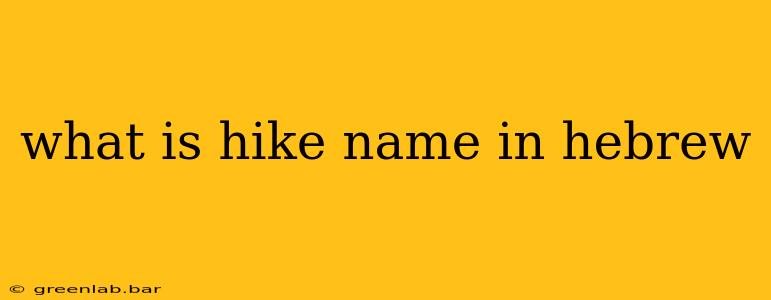What is "Hike" in Hebrew?
There isn't a single perfect translation for the English word "hike" in Hebrew, as the best choice depends on the nuance you want to convey. The term "hike" encompasses a range of activities, from a short walk in nature to a strenuous multi-day trek. Therefore, several Hebrew words and phrases could be appropriate, each with subtle differences in meaning:
Options for Translating "Hike" in Hebrew:
-
טיול בטבע (tiyul ba-teva): This is a common and versatile option. It literally translates to "a walk/stroll in nature." This is a good choice for a leisurely hike, a nature walk, or a relatively short excursion. It's suitable for most casual hiking scenarios.
-
הליכה (halicha): This simply means "walking." While less evocative than other options, it's perfectly understandable and suitable if the context is clear. It might be best used when talking about the act of hiking, rather than the event itself.
-
טרק (trek): This is a loanword from English, directly adopted into Hebrew. It's suitable for longer, more challenging hikes, often involving multiple days and significant physical exertion. Use this term when describing a serious backpacking trip or mountaineering expedition.
-
מסע רגלי (masa regalit): This translates to "foot journey" or "pedestrian journey." It's a more formal and descriptive term, suitable for describing longer, more adventurous hikes or expeditions. This phrase conveys a sense of purpose and journey.
-
טיול רגלי (tiyul regalit): This combines the more casual "tiyul" with the specification of "on foot." This option offers a balance between the casual feel of "tiyul" and the emphasis on walking.
Choosing the Right Word:
The best translation depends on the context. Consider:
-
Length of the hike: A short walk in the park would be a tiyul ba-teva, while a multi-day trek across a mountain range would be a trek or masa regalit.
-
Difficulty of the hike: A leisurely stroll is a tiyul, while a challenging climb is a trek.
-
Formal vs. informal context: Halicha is a simple, straightforward word, while masa regalit is more formal and descriptive.
Ultimately, the most natural-sounding option will depend on the specific situation. For most everyday conversational purposes, טיול בטבע (tiyul ba-teva) will likely be the most appropriate and widely understood translation.

